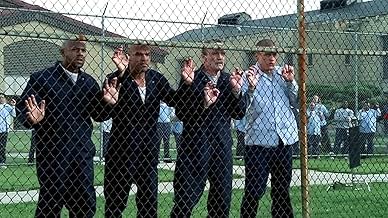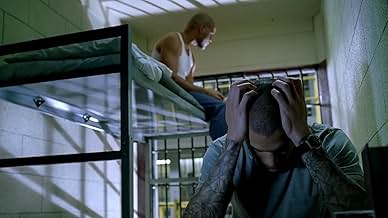End of the Tunnel
- Episode aired Nov 28, 2005
- TV-14
- 1h
IMDb RATING
9.0/10
6.9K
YOUR RATING
The escape is about to go through when the team hits a stainless steel snag, while Veronica is just a moment too late to get all the information she needs to prove Lincoln's innocence.The escape is about to go through when the team hits a stainless steel snag, while Veronica is just a moment too late to get all the information she needs to prove Lincoln's innocence.The escape is about to go through when the team hits a stainless steel snag, while Veronica is just a moment too late to get all the information she needs to prove Lincoln's innocence.
- Director
- Writer
- All cast & crew
- Production, box office & more at IMDbPro
9.06.9K
1
2
3
4
5
6
7
8
9
10
Featured reviews
Survival vs. Loyalty
Here's the perfect portrait of how the show masters the art of building layered tension, playing with the characters' desperation and the audience's anxiety. We've hit a critical point in the narrative: the escape plan, which finally seemed to be coming together, now faces almost insurmountable obstacles-and the most symbolic of them is Lincoln himself, the reason for this whole operation, now stuck in solitary, left to wait for his own death. Michael's dilemma isn't just logistical; it's existential. He's standing at a moral crossroads: does the plan even matter if he can't save his brother? His refusal to move forward without Lincoln is both proof of his unshakable loyalty and a dangerous vulnerability. The clash with the rest of the group, who don't share the same emotional bond, sparks an inevitable conflict: how far can individual survival outweigh the collective mission?
T-Bag is the catalyst for this kind of tension. He's the opposite of Michael's idealism-selfish, pragmatic, and lethally calculating. His line, "I'm going through that hole with or without you," is basically a manifesto of the raw survival instinct that drives most of the inmates. The contrast between him and Michael couldn't be more striking, and the script knows how to explore that without turning it into a caricature. The same goes for Westmoreland and C-Note, who, while less explosive, also start showing cracks in their loyalty to the original plan. It's interesting how the episode reveals that, at the end of the day, the group is a fragile alliance held together more by necessity than any real sense of friendship or camaraderie. Everyone has their own agenda, and the escape is just a means to a personal end.
The sequence where Michael resorts to the poisoned pill trick to get Lincoln out of solitary is one of the episode's high points. The scene where he cuts into his own arm to retrieve the pill hidden under his skin is a brutal reminder of how far he's willing to go. It's not just the ingenuity of the plan that's impressive, but the level of personal sacrifice involved. The symbolism of the cross, both on his arm and on the rosary, adds an almost biblical layer to the act-Michael is literally wounding himself to save his brother, a kind of physical penance that reflects his devotion. Lincoln's desperation as the poison kicks in is palpable, and the way the show handles the sequence-with the clock ticking toward 8:10-shows "Prison Break's" absolute mastery over narrative pacing.
Outside the prison, the Veronica and Hale storyline keeps digging into the darker side of the conspiracy tied to the Vice President. The dynamic between Hale and Kellerman is fascinating because it subverts the typical one-dimensional villain duo. Hale, despite being on the wrong side of history, is a man torn apart by his conscience, and his decision to help Veronica is a late attempt at redemption. The episode does a great job humanizing him without trying to absolve his past actions. Kellerman, on the other hand, is evil in its purest form-ruthless, cold, and always one step ahead. The final encounter between Veronica and Hale ends in the most tragic way possible, with any shred of hope brutally crushed: Hale's dead, and Kellerman has the envelope with the crucial information. That's what the show does best-feeding the audience small doses of optimism only to flip them upside down in the next breath.
The episode's climax, with the group finally making their way through the tunnels only to hit a dead end right before the infirmary, is a gut punch. After all the planning, all the engineering, and every sacrifice made so far, they're met with an impassable barrier. The tight camera work, claustrophobic lighting, and the tense silence broken only by Michael's muffled frustration create a suffocating atmosphere. The looming threat of T-Bag, creeping closer with an improvised weapon, is the cherry on top of all that built-up tension. He's not just a physical threat-he's a constant reminder that danger for Michael isn't limited to what's outside the prison walls.
All in all, this episode is a masterclass in keeping the audience on the brink of a nervous breakdown, balancing moments of strategic brilliance with raw human emotion. What "Prison Break" does so well here is showing that the real obstacle to freedom isn't just the bars or the guards-it's the inmates themselves and the choices they make when they're cornered. The episode ends with more questions than answers, and that's exactly what makes it so electrifying: the sense that everything could fall apart at any moment. And maybe it already is.
T-Bag is the catalyst for this kind of tension. He's the opposite of Michael's idealism-selfish, pragmatic, and lethally calculating. His line, "I'm going through that hole with or without you," is basically a manifesto of the raw survival instinct that drives most of the inmates. The contrast between him and Michael couldn't be more striking, and the script knows how to explore that without turning it into a caricature. The same goes for Westmoreland and C-Note, who, while less explosive, also start showing cracks in their loyalty to the original plan. It's interesting how the episode reveals that, at the end of the day, the group is a fragile alliance held together more by necessity than any real sense of friendship or camaraderie. Everyone has their own agenda, and the escape is just a means to a personal end.
The sequence where Michael resorts to the poisoned pill trick to get Lincoln out of solitary is one of the episode's high points. The scene where he cuts into his own arm to retrieve the pill hidden under his skin is a brutal reminder of how far he's willing to go. It's not just the ingenuity of the plan that's impressive, but the level of personal sacrifice involved. The symbolism of the cross, both on his arm and on the rosary, adds an almost biblical layer to the act-Michael is literally wounding himself to save his brother, a kind of physical penance that reflects his devotion. Lincoln's desperation as the poison kicks in is palpable, and the way the show handles the sequence-with the clock ticking toward 8:10-shows "Prison Break's" absolute mastery over narrative pacing.
Outside the prison, the Veronica and Hale storyline keeps digging into the darker side of the conspiracy tied to the Vice President. The dynamic between Hale and Kellerman is fascinating because it subverts the typical one-dimensional villain duo. Hale, despite being on the wrong side of history, is a man torn apart by his conscience, and his decision to help Veronica is a late attempt at redemption. The episode does a great job humanizing him without trying to absolve his past actions. Kellerman, on the other hand, is evil in its purest form-ruthless, cold, and always one step ahead. The final encounter between Veronica and Hale ends in the most tragic way possible, with any shred of hope brutally crushed: Hale's dead, and Kellerman has the envelope with the crucial information. That's what the show does best-feeding the audience small doses of optimism only to flip them upside down in the next breath.
The episode's climax, with the group finally making their way through the tunnels only to hit a dead end right before the infirmary, is a gut punch. After all the planning, all the engineering, and every sacrifice made so far, they're met with an impassable barrier. The tight camera work, claustrophobic lighting, and the tense silence broken only by Michael's muffled frustration create a suffocating atmosphere. The looming threat of T-Bag, creeping closer with an improvised weapon, is the cherry on top of all that built-up tension. He's not just a physical threat-he's a constant reminder that danger for Michael isn't limited to what's outside the prison walls.
All in all, this episode is a masterclass in keeping the audience on the brink of a nervous breakdown, balancing moments of strategic brilliance with raw human emotion. What "Prison Break" does so well here is showing that the real obstacle to freedom isn't just the bars or the guards-it's the inmates themselves and the choices they make when they're cornered. The episode ends with more questions than answers, and that's exactly what makes it so electrifying: the sense that everything could fall apart at any moment. And maybe it already is.
Did you know
- TriviaC-Note says to T-Bag: "We'll be there Cletus, don't worry". This is a reference to Cletus Spuckler, also called Cletus the Slack-Jawed Yokel, a character from The Simpsons (1989). He is a stereotypical redneck, known for his stupidity.
- GoofsMichael climbs up a rope tied to a sewer grate to get into the room that is near the infirmary. However, if the rope is tied to the sewer grate, and he is hanging from that rope, how does he lift the sewer grate?
- Quotes
Michael Scofield: [Michael has just discovered, during the escape, that the flimsy pipe leading to the infirmary has been replaced with a steel one] It can't be done.
- SoundtracksMain Titles
Composed by Ramin Djawadi
Details
Contribute to this page
Suggest an edit or add missing content



























